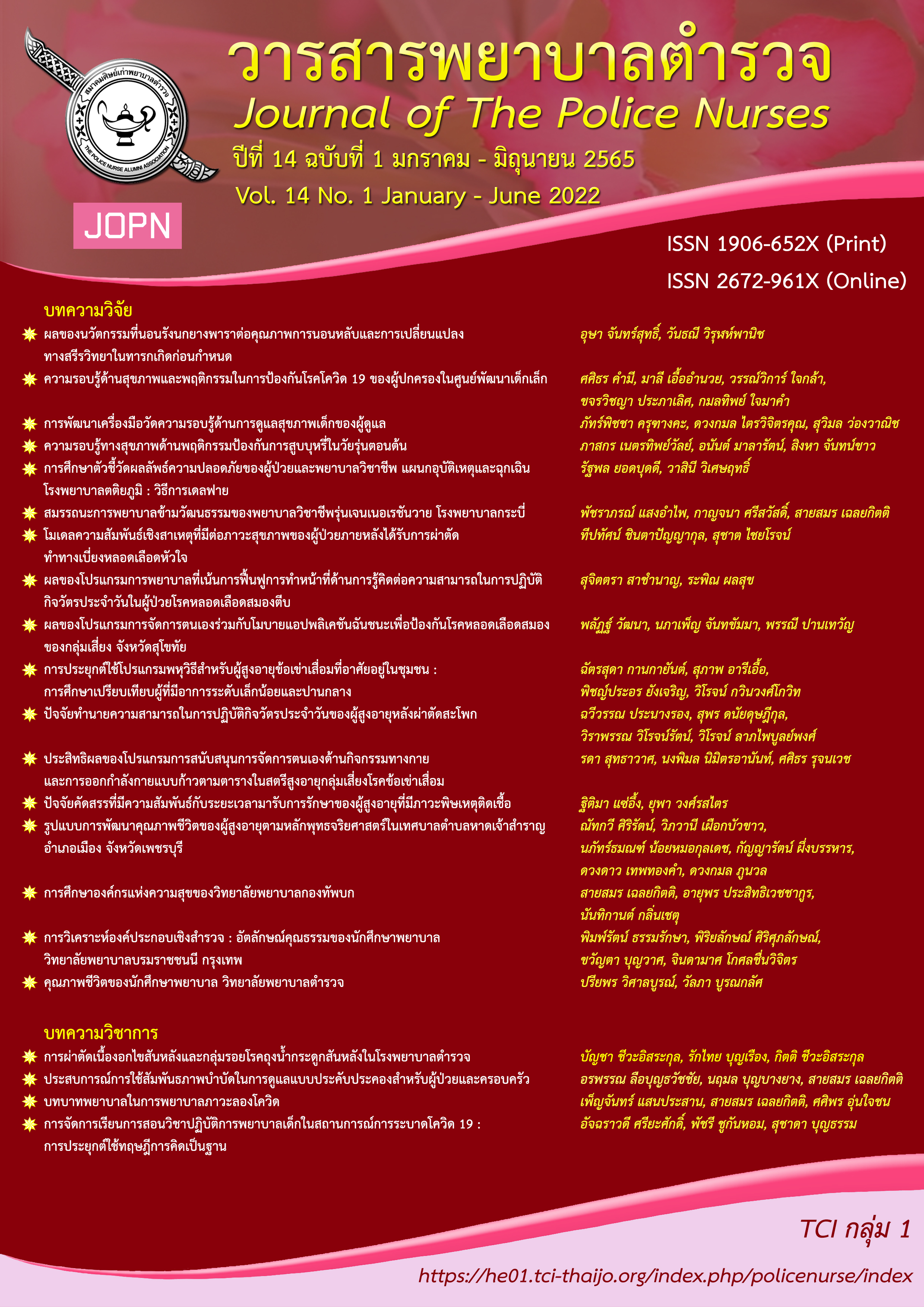EFFECTS OF THE SELF MANAGEMENT PROGRAM WITH CHAN CHANA MOBILE APPLICATION FOR CEREBROVASCULAR DISEASE PREVENTION IN RISK GROUP SUKHOTHAI PROVINCE
Keywords:
self-management, mobile application, stroke prevention behaviors, hypertensionAbstract
This quasi-experimental research aimed to study the stroke prevention behaviors, levels of high blood pressure, and cardiovascular disease risk in the experimental group before and after enrolling in the stroke prevention program and between the experimental group after enrolling in the stroke prevention program and a comparative group. Seventy-six hypertension patients who had not previously been diagnosed with a stroke, aged from 35 to 70 years old, were recruited and separated into 2 groups as mentioned. The instruments were the self-management program with Chan Chana application, a web assessment application for the Thai Cardiovascular Disease (CVD) risk score, and a stroke prevention behavior questionnaire. The instruments were examined the content validity by experts and achieved a .90 score. Cronbach's alpha coefficient was .77. The data were analyzed using descriptive statistics, t-test, Mann-Whitney U test, and Wilcoxon signed-rank test.
The research result showed that after enrolling in the program, the experimental group had a significantly higher mean score in the stroke prevention behaviors than before enrolling in the program and the comparative group at the level of .05. Moreover, the mean score of blood pressure and cardiovascular disease risk of the experimental group was significantly lower than before enrolling in the program and the comparative group at the level of .05.
The health care providers should promote the self-management program with the Chan Chana application to be a guideline for developing a care model for clinical chronic illness outcomes.
Downloads
References
Aekplakorn, W. (Ed.). (2016). Thai national health examination survey, NHES V. Bangkok: Aksorn graphic and design.
Best, J. W. (1997). Research in education (3rd ed.). Englewood Cliffs, NJ: Prentice-Hall.
Khamchata, L., Wattana, C., & Harnirattisai, T. (2017). The effects of a self-management program on self-management behaviors, waist circumference, blood sugar level, and cardiovascular disease risk among person with metabolic syndrome. Nursing Journal CMU, 44(3), 65-76.
Creer, T, L. (2000). Self-management of chronic illness. In Handbook of self-regulation. California, CA: Academic.
Division of Complementary and Alternative Medicine; Department of Thai Traditional and Alternative Medicine. (2021). DASH diet. Retrieved from https://thaicam.go.th
Division of Non Communicable Disease; Department of Disease Control. (2022). Non communicable disease data 2018-2020. Retrieved from http://thaincd.com/2016/
Hunsuwan, B. (2018). Effect of self-management program on hypertensive patients in Phetlakorn district health promoting hospital, Nongphai district, Phetchabun province (Master ofpublic health program). Naresuan University, Phitsanulok.
Komton, V. (2019). Stroke patients self-management: Application of empirical evidence, Journal of Thailand Nursing and Midwifery Council, 31(1), 25-41.
Ministry of Public Health. (2021). Health data center (HDC). Retrieved fromhttp://hdc.ntwo.moph.go.th/hdc/main/index.php
Paz-Pacheco, E., Sandoval, M. A., Ardena, G. J. R., Paterno, E., Juban, N., Lanting-Ang, F. L., . . . Bongon, J. (2017). Effectiveness of a community-based diabetes self-management education (DSME) program in a rural agricultural setting. Primary Health Care Research, 18, 35-49. https://doi.org/10.1017/S1463423616000335
Ruamwong, N., Boonlue, O., Lekwong, S., & Soontronchi, S. (2020). An effect of the self-management program on health behaviors to decrease the CV risk score in patients with hypertension. Journal of The Police Nurse, 12(1), 128–137.
Sirimongkollertkul, N., Singmanee, C., Rattanawichai, T., & Pongleerat, S. (2020). The development of an application for monitoring diabetic patients in the community. Royal Thai Army Medical Journal, 73(3), 141-150.
Thai Hypertension Society. (2019). Thai guidelines on the treatment of hypertension. Chiangmai: Trickthink.
Vathesatogkit, P. (2016). Thai CV risk score application. Retrieved from https://med.mahidol.ac.th/cardio_vascular_risk/thai_cv_risk_score/
Wangtapan, K. (2019). Stroke prevention self-management program in patients with uncontrolled hypertension (Master of nursing science program, community nursing). Huachiew Chalermprakiet University, Bangkok.
Wankham, P., Wattana, C., & Khampalikit, S. (2015). The effects of a self-management program on hypertension controlling behaviors and mean arterial pressure among persons with hypertension. Nursing Journal, 42(1), 49-60.
World Stroke Organization. (2022). Global stroke fact sheet 2022. Retrieved from https://www.world-stroke.org
Downloads
Published
How to Cite
Issue
Section
License
Copyright (c) 2022 JOURNAL OF THE POLICE NURSES

This work is licensed under a Creative Commons Attribution-NonCommercial-NoDerivatives 4.0 International License.
ผลงานที่ได้ตีพิมพ์แล้วจะเป็นลิขสิทธิ์ของวารสารพยาบาลตำรวจ















